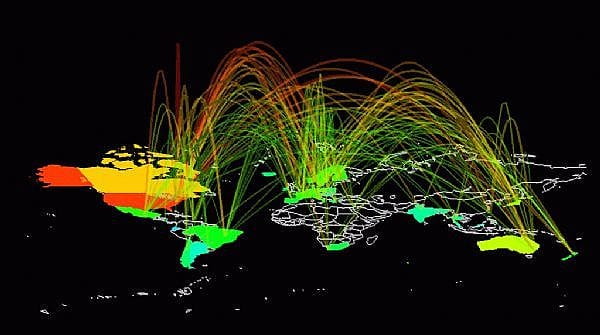Globalization timeline

Courtesy Wikimedia Commons
Introduction – Globalization timeline
A computer needs global social organization to gather the resources that are required. It is the uneven distribution of human, mineral and organic resources across the planet that creates todays trade network. In general the more complex the system and greater the encouragement of innnovation the greater the wealth generated but this can be exported as occurred with China. Science and technology entail embedded knowledge, the average automobile today linked to 100,000 patents. After 1950 there was a Great Acceleration in human population, economic activity, and per capita GDP.
The rate of environmental, social, and economic change has closely matched the rate of increase in human population – 10 million in 10,000 BCE, 135 million in 1500, and 7.5 billion in 2017. The population explosion that occurred between 1700 and 1900 was accompanied by a massive increase in technological capacity as a consequence of the Scientific and Industrial Revolutions that occurred through the Age of Discovery which was marked by northwestern European maritime colonial expansion away from the old Mediterranean trade routes and into the Atlantic, Indian, and Pacific Oceans to develop a truly global economy dominated by European (mostly British) values, traditions, and social institutions. Collectively this has become known as the Great Divergence.
Between 1960 and 2000, even after two world wars, the population would again double in the Great Acceleration whose technology now created a transport and communication revolution as part of an electronic age in a world strongly influenced by America and American culture. The last decade or so has seen China adopt a market economy and rapid economic growth.
Globalization timeline – History
Globalization is a term that denotes the interconnectedness of the world, both economically and culturally. The concept of globalization has been around for centuries, but it was not until the 20th century that it truly began to take hold and shape the world as we know it today. In this essay, we will explore the history of globalization, from its early beginnings to the present day.
The roots of globalization can be traced back to ancient times, when trade routes connected different parts of the world and facilitated the exchange of goods, ideas, and cultures. The Silk Road, for example, was a network of trade routes that connected China to Europe, allowing for the exchange of silk, spices, and other goods. The Silk Road played a crucial role in the spread of ideas, technology, and religion across different cultures.
During the Age of Exploration in the 15th and 16th centuries, European powers began to explore and colonize new territories around the world. This period of exploration led to the establishment of trade routes and the exchange of goods between Europe, Africa, and the Americas. The Columbian Exchange, for example, facilitated the exchange of crops, animals, and diseases between the Old World and the New World, transforming both continents in the process.
The industrial revolution in the 18th and 19th centuries further accelerated the process of globalization. Advances in technology and transportation, such as the steam engine and the telegraph, allowed for faster and more efficient communication and trade between different parts of the world. The rise of multinational corporations and the spread of capitalism also played a significant role in shaping the global economy.
The 20th century saw a further intensification of globalization, with the advent of new technologies such as the internet and telecommunications. These technologies have made it easier than ever for people to connect and communicate with each other across vast distances. The rise of multinational corporations, global supply chains, and outsourcing have also transformed the global economy, leading to increased interdependence between countries.
One of the defining features of globalization in the 20th century was the establishment of international organizations such as the World Trade Organization (WTO) and the International Monetary Fund (IMF). These organizations were created to promote free trade and economic cooperation between countries, with the aim of fostering economic growth and development. Globalization also led to the creation of regional trade agreements such as the European Union and NAFTA, which further facilitated trade between countries in these regions.
Globalization has had both positive and negative effects on the world. On the one hand, globalization has led to increased economic growth, improved living standards, and the spread of ideas and culture across different parts of the world. On the other hand, globalization has also led to increased inequality, environmental degradation, and the loss of cultural identity in some regions.
Globalization has also sparked a backlash in some parts of the world, with some people feeling that it has led to the erosion of national sovereignty and the loss of jobs to other countries. The rise of populist movements and protectionist policies in recent years can be seen as a reaction to the perceived negative effects of globalization.
In conclusion, globalization is a complex and multifaceted phenomenon that has shaped the world in profound ways. From its early beginnings in ancient trade routes to the present day, globalization has transformed the global economy, culture, and society. While globalization has brought many benefits, it has also led to challenges and controversies that must be addressed in order to create a more inclusive and sustainable global economy.(AI –
GPT-4o)
Globalization timeline
BCE
100,00 BCE – Modern era Globalization of Homo sapiens
10,000-8,000 BCE – Sedentary cultures emerge in West Asia/North Africa
9,700 BCE – End of last Ice Age and beginning of Holocene
3,500 BCE – Wheeled vehicles appear in various locations from the Indus Valley to Mesopotamia, the Caucasus and Central Europe
3,200 BCE – Earliest known writing appears in Mesopotamia
700 BCE – First coins minted by ancient Lydians
600 BCE – Writing appears independently in Mesoamerica
312 BCE – Work on first aqueduct commenced in Rome
200 BCE – paper invented in China
CE
618-907 – First paper money produced in China
800 – Gunpowder invented in China
c.1000 – Vikings sail to North America
1450 – First European printing press invented
1492-1504 – The voyages of Columbus
1492 – Dawn of ‘Age of Discovery’
1519-1522 – Spanish (Magellan) lead the first circumnavigation of the Earth
1350 – 1650 – Renaissance (approximate dates)
1517 – Protestant Reformation begins in Germany
1550-1800 – Scientific Revolution (approximate dates)
1582 – Gregorian (Western) calendar developed
1625 – Publication of On the Law of War and Peace by Hugo Grotius marking the beginnings of international law
1648 – End of Thirty Years War in Europe symbolizing beginnings of sovereign state system
1650 – 1800 – Enlightenment (approximate dates)
c.1700 – North and South America fully colonized by European settlements
c.1750-1850 – The Industrial Revolution in Britain
1764 – James Hargreaves invents the Spinning Jenny
1769 – James Watt improves the steam engine, subsequently harnessed for industrial and transport uses. Richard Arkwright develops the water frame
1779 – First steam powered mills. Samuel Crompton invents the mule combining the spinning jenny and water frame
1794 – Eli Whitney patents the cotton gin
1801 – Richard Trevithick reveals the steam locomotive
1821 – Michael Faraday develops the fundamental basis for the electric motor
1834 – Charles Babbage develops the forerunner of the computer
1837-1844 – Samuel Morse invents the telegraph
1843 – The first large, iron, steamship
1855 – Henry Bessemer invents a method for processing steel out of iron
c.1800 – Australasia and the Pacific opened up to European influence
1817 – New York Stock Exchange established
1840 – First World Ant-Slavery Convention held in London
1851 – First World Fair held in London
1844 – Greenwich Mean Time established
1874 – Universal Postal Union established
1876 – Alexander Bell patents first practical telephone
1896 -First modern Olympic Games held in Athens
1899 – First International Peace Convention held in The Hague
1903 – First manned, powered flight by Wright Brothers in US
1914-1918 – First ‘World’ War
1918-1919 – First truly global pandemic in the form of influenza infected one-third of the world population and killed 50 million
1919 – League of Nations established
1929 – First global financial crisis triggered by stock market crash on Wall Street leading to Great Depression
1939-1945 – Second ‘World’ War
1936 – The UK’s BBC transmits first television service
1945 – United Nations established
1945 – International Monetary Fund (IMF) becomes operational
1945 – Cold War commences
1945-1970 – Main period of decolonization
1948 Universal – Declaration of Human Rights
1955 – First MacDonald’s Restaurant opens
1957 – First Satellite launched by Soviet Union
1961 – ‘Globalization’ first appears in Webster’s dictionary
1964 – First desktop computer produced
1964 – First commercial fax machine patented
1973 – First handheld mobile phone produced
1973-1975 – Global recession follows oil crisis
1979 – Smallpox eradicated worldwide
1988 – Intergovernmental Panel on Climate Change (IPCC) established by UN
1989 – Cold War ends
1991 – Word Wide Web established
1992 – First Earth Summit held in Rio de Janeiro
1992 – First machine-generated SMS or text message sent
1993 – First Web browser released
1994 – First International WWW conference held at CERN in Switzerland where the web originated
1995 – World Trade Organization (WTO) established
1999 – Euro introduced to world financial markets
2000 – Pyrenean Ibex declared extinct
2001 – World Trade Centre in New York destroyed by Islamic extremists on ‘9/11’
2001 – Wikipedia launched
2004 – Facebook launched
2005 – YouTube launched
2006 – West African Black Rhino declared extinct
2007 – Apple launches iPhone
2007-2008 – Global Financial Crisis begins in banking industry
2009 – Sovereign debt crisis in Europe
2010 – Apple launches iPad
2011 – World population surpasses 7 billion
2011 – South Sudan becomes world’s 193rd independent state
2012 – Construction of world’s first 1-gigawatt wind farm commences in UK
2013 – IPCC delivers 5th assessment report on climate change
—
First published on the internet – 1 March 2019


